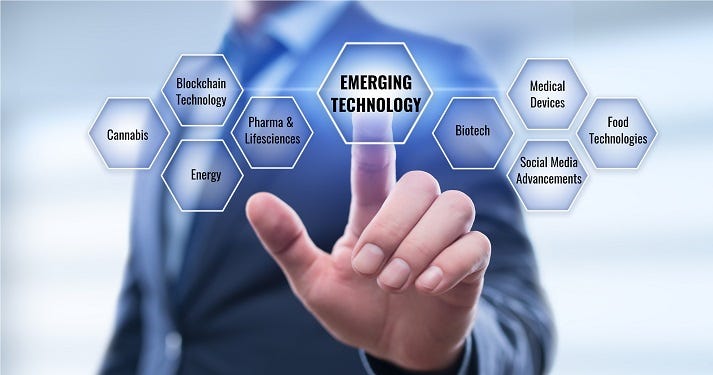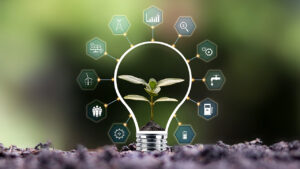Emerging technology refers specifically to technologies which are at the beginning stages of development or acceptance however they have the potential to make significant changes to industries as well as societies and economies. They often determine the future by solving problems that are currently facing us or by offering enhancements to current technology. From automation to improved connectivity, new technologies affect everything from businesses to the way people interact with one another. Knowing these technologies is crucial to stay ahead of the curve in the rapidly changing world.
Key Characteristics of Emerging Technologies
The latest technologies are unique and have distinctive characteristics which distinguish them from conventional developments. They typically involve revolutionary ideas and techniques that go beyond traditional practices. A key feature that differentiates them from other technologies is the fact they are disruptive that could challenge established industries and create new paradigms. The emerging technologies are also highly dynamic, constantly changing as advances within research and development expand the boundaries of. Another characteristic is their scaling; these technologies usually can expand exponentially, affecting various industries across the globe. Furthermore, they typically make use of cutting-edge technologies such as artificial intelligence, automation or distributed networks.
Artificial Intelligence and Machine Learning
Artificial Intelligence (AI) as well as machine-learning (ML) are at the forefront of new technologies. These breakthroughs involve the creation of systems that can do tasks that normally require human brainpower for, like problem-solving, decision-making, as well as language processing. Machine learning, which is a subset of AI is focused on making systems be able to learn from their data in order to enhance the performance of their systems over time with no explicit programming. The applications to AI and ML cover a variety of fields such as medical, which is where they assist in diagnosing, and finance, which helps in the detection of fraud. The capability of these technologies to analyse vast amounts of data and anticipate trends is a valuable tool for both individuals and businesses.
Internet of Things (IoT)
The Internet of Things (IoT) is the term used to describe the interconnected network of devices that share and communicate data without the need for human intervention. The devices range from smart household appliances to industrial machines and are all outfitted with sensors and software to facilitate the seamless exchange of data. IoT seeks to create smarter environments through improving efficiency, cutting costs, and enhancing the user experience. In the case of agriculture, for instance IoT-connected devices can track soil conditions and improve irrigation systems, which results in higher yields from crops. In bridging the physical and digital realms, IoT is transforming sectors like healthcare, manufacturing as well as urban planning.
Blockchain Technology
Blockchain technology is yet another notable instance of a new technology that is most commonly referred to as the underlying technology of cryptocurrencies such as Bitcoin. But its applications go well beyond the realm of digital currency. Blockchain functions as an uncentralized ledger that tracks transactions in a secure and transparent manner and is the ideal choice for industries that require data integrity. For instance in logistics management and supply chain, the blockchain guarantees transparency by logging every stage of the product’s journey. The immutability of blockchain and its security against tampering give it an edge. security, particularly in fields like healthcare records and voting systems. Although it is still gaining traction in its adoption blockchain has huge potential to revolutionize various sectors.
Virtual and Augmented Reality
Virtual Reality (VR) and Augmented virtual reality (AR) are changing the way we perceive and interact with digital spaces. VR lets users experience immersive environments that are fully-simulated using devices such as headsets, which makes it the most popular gaming device as well as training simulators. However, AR enhances the real world by overlaying digital data that can be accessed via smartphone as well as AR glasses. These technologies are now extending beyond entertainment to include areas like education, which allows for immersive learning experiences and retail which is where AR lets customers see the items prior to purchasing. The capability to use VR or AR combine technology with reality has transformed consumer engagement in business.
5G Technology
5G, the 5th generation of mobile technology is revolutionizing connectivity by providing unbeatable speeds, low delay, as well as the capability to connect a huge amount of devices simultaneously. This technology opens the door for new applications like real-time remote surgery autonomous vehicles, as well as smart cities. For the consumer, 5G promises seamless streaming and speedier downloads and for businesses, it is possible to deploy advanced IoT networks to improve their digital processes. The enhanced connectivity offered by 5G opens up opportunities for improved efficiency, collaboration and growth across many sectors.
Impact on Industries
The impact of the latest technological advancements on industry is significant creating innovation and allowing companies to adjust to evolving market needs. For instance, in the field of healthcare AI-powered diagnostic tools and IoT-connected monitoring devices are improving the quality of care for patients. Automotive companies are leveraging 5G and IoT in order to create self-driving cars. Blockchain can improve transparency in supply chain and finance management. New technologies are also helping to facilitate the development of new industries like telemedicine and remote work platforms that have gained a lot of attention during the COVID-19 epidemic. Companies that make use of these technologies usually have an advantage in competitiveness through optimizing processes, reducing expenses, and launching new products.
Challenges and Opportunities
Although emerging technologies present a myriad of possibilities, they also present serious problems. The speed of technological advancements frequently outpaces regulations, raising questions about security, privacy, and ethical concerns. For instance, the wide-spread application of AI raises concerns regarding data bias and accountability. Furthermore, the initial costs of implementing new technologies could be prohibitive for small-scale businesses or for individuals. However their opportunities are huge. In fostering innovation, driving the economy, and taking care of the social problems They are able to help create more efficient, connected and sustainable future. People and companies that are able to change and adapt will succeed in the ever-changing world.
The Road Ahead
New technologies are a potent impact on the world in the way we see it. Starting with AI to IoT and beyond, these technologies can solve current issues and provide the means for new possibilities. While the road to acceptance is a complex one and complexities, knowing about the technology is crucial to being competitive and ready in the coming years. By being aware and exploring potential applications, businesses as well as individuals can discover opportunities to improve and transform their industry.
FAQs
1. Are there any examples of the newest techniques?
New technologies are emerging, including artificial intelligence blockchain virtual and augmented realities 5G, Internet of Things (IoT).
2. What is the reason why AI thought of as to be an emerging tech?
AI has revolutionized the way companies work by enhancing efficiency in the workplace, enhancing intelligence, and automating. Its growth potential is a major driver in the field of innovation.
3. Which industries are most affected by new technology?
Industries such as finance, healthcare manufacturing, education, and retail are impacted because of improved efficiency, customisation and the development of innovative solutions.
4. What challenges do emerging technologies pose?
Some of the biggest issues are cost-of-adoption that is high as well as regulatory uncertainty privacy issues, and ethical concerns.
5. What can businesses do to benefit from the latest technology?
Businesses can benefit from these new technologies to improve processes, increase customer satisfaction, generate new revenue streams and keep competitive.




